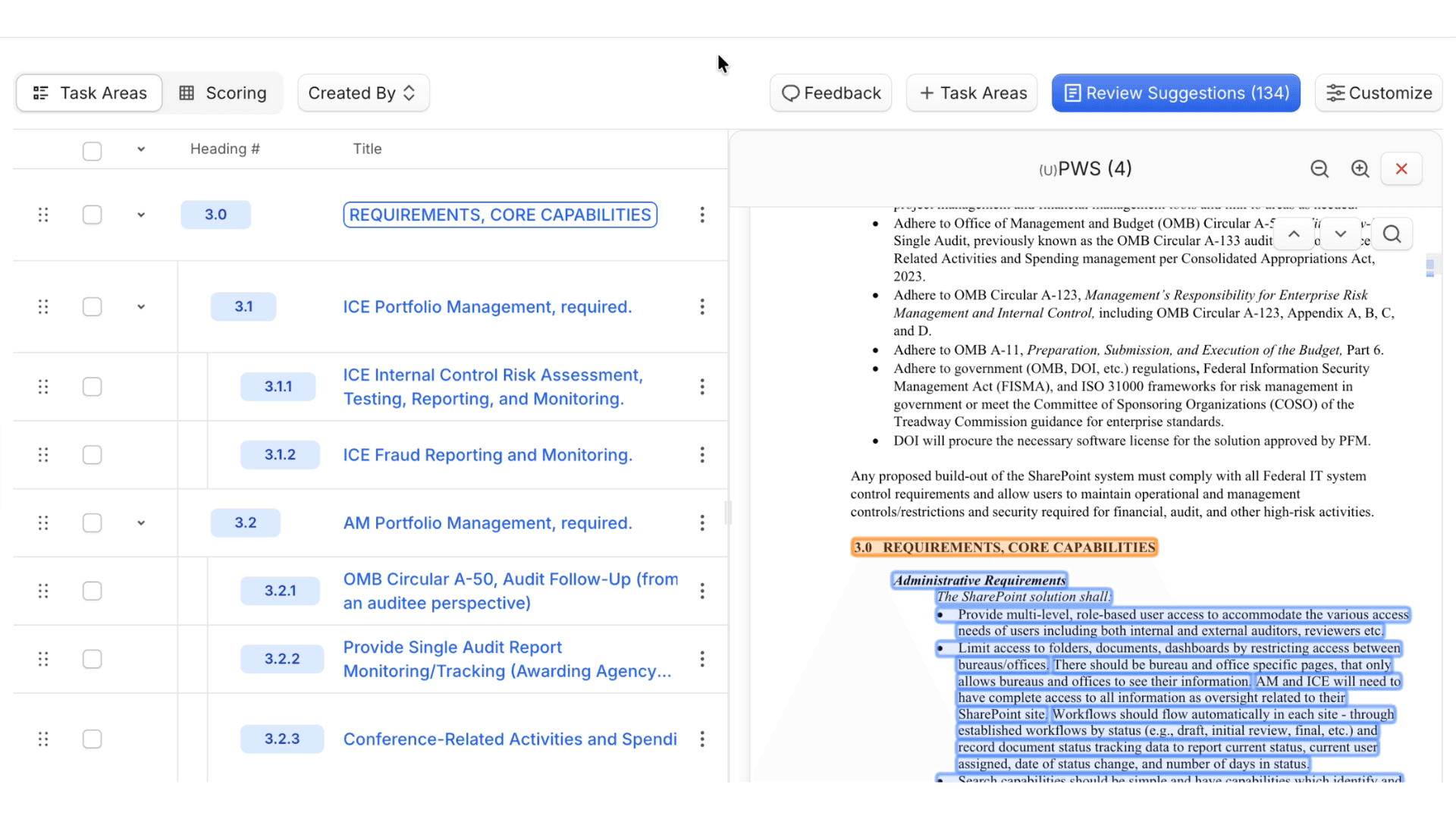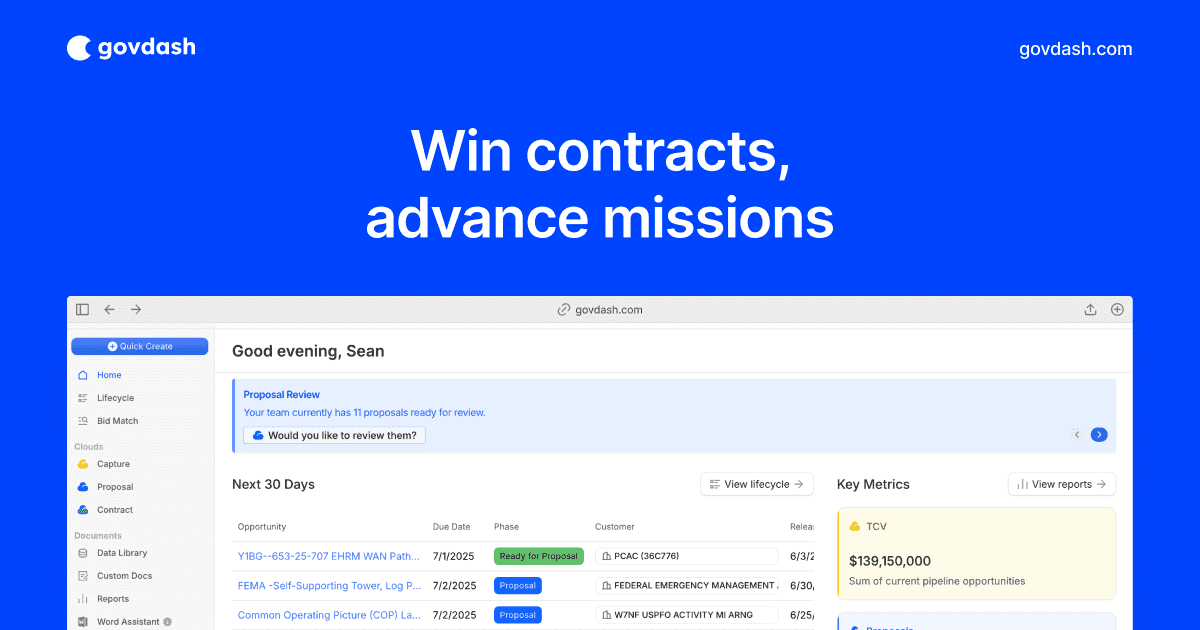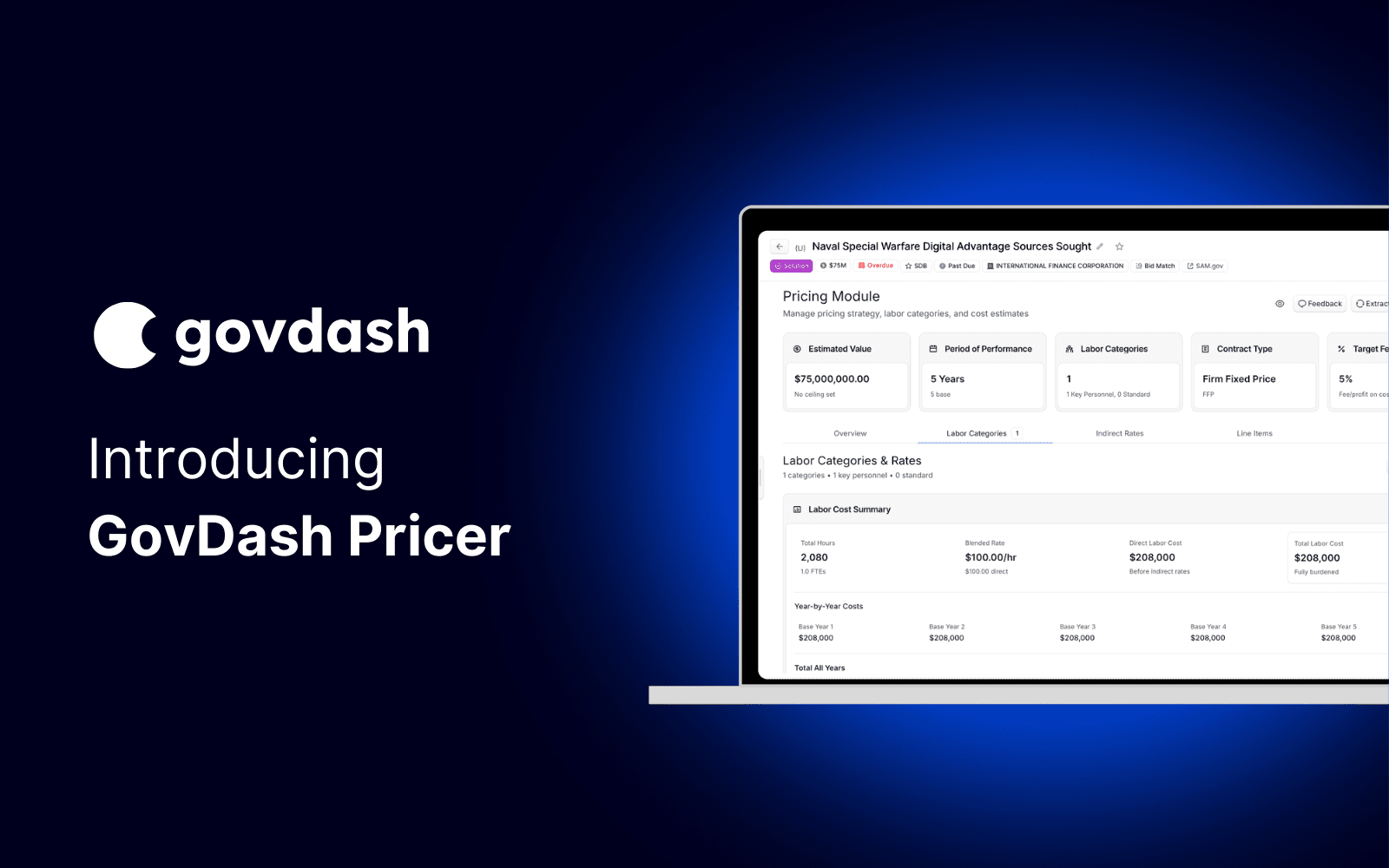Articles
Mastering Government Proposal Writing
Winning a government contract can be a game-changer for your business. But the path to victory is paved with detailed requirements and fierce competition. In this guide, we dissect the art and science of government proposal writing, offering you a roadmap to navigate this complex landscape. Whether you're a seasoned contractor or a newcomer, this guide will equip you with the tools to stand out and win.
TL;DR
Government proposal writing requires strict compliance with RFP guidelines and clear value demonstration
Quality proposals include data-backed claims, professional formatting, and detailed technical specs
Rejections provide feedback to refine your approach for future contract opportunities
AI tools now automate proposal generation while maintaining compliance and organizational consistency
GovDash unifies capture, proposal development, and contract management with AI assistance
Why it's important
Government contracts contribute approximately $600 billion in annual spending. If you have the best offering for a given solicitation, then it's important to make sure the government knows that. This is why proposal writing is so important - it's how you show that you're the best, and why you should win.
By mastering government proposal writing, you can gain a competitive edge, increase credibility, and submit more successful bids.
Understanding the proposal evaluators mindset
Before you write a single word, you need to understand who's reading your proposal and what they're looking for. Evaluators work under strict timelines and formal processes. Every minute counts. That means your proposal must be clear, compliant, and concise.
What proposal evaluators look for
Evaluators use structured score sheets to measure clarity, risk mitigation, traceability, and staffing. They're balancing two perspectives: program managers focus on mission success, while contracting officers prioritize best value and compliance. The golden rule: align your proposal tightly with the evaluation criteria. Read the requirements and answer them directly. No fluff, no tangents. Learn proven strategies for winning government contracts from Bill Pratt, President of GovITWorks and former Director at the Department of Homeland Security.
Preparation: Don't miss key requirements
Before starting the writing process, it's critical to understand the contracting officer's requirements. Start by going through the RFP to identify key requirements, requested format, evaluation factors, and the submission schedule. A well-structured proposal writing plan will help you stay organized and ensure that you meet all the necessary deadlines.
Learn more about how GovDash automatically creates a compliance matrix →
Crafting the proposal
Crafting a winning government proposal is less about flowery language and more about precision, compliance, and value proposition. First, adhere to the RFP (Request for Proposal) guidelines; any deviation can result in immediate disqualification. Use clear, concise language to articulate your solution, avoiding jargon unless it's industry-specific and relevant. Include data and case studies to substantiate your claims, demonstrating a track record of success and reliability. Structure the proposal logically, usually mirroring the RFP's own structure, to make it easy for evaluators to find the information they're seeking. Finally, focus on the executive summary; this is often the only section that senior decision-makers read. Make it compelling, summarizing your unique value proposition and why it aligns with the government agency's objectives.

Quality matters
A high-quality proposal signals your company's competence, attention to detail, and commitment to excellence. It's not just about meeting the minimum requirements; it's about exceeding them to show that you can bring additional value to the table.
Here's what you need to know to master quality:
Compliance: First and foremost, please follow the guidelines and requirements outlined in the RFP. Missing even a minor detail can result in disqualification.
Clarity and Precision: Use clear, straightforward language. Avoid ambiguity, as it can lead to misunderstandings and give the impression of uncertainty or lack of expertise.
Data-Backed Assertions: Support your claims with complex data, case studies, or testimonials. This substantiates your proposal and also demonstrates a track record of reliability and success.
Professional Presentation: Formatting, layout, and design matter. A well-organized, visually appealing proposal is easier to read and leaves a positive impression.
Executive Summary: This is often the first (and sometimes only) section that decision-makers read. Make it compelling by summarizing your unique value proposition and how it aligns with the agency's needs.
Technical Specifications: Be meticulous in outlining how you intend to meet or exceed the contract's technical requirements. Lack of detail here can be a red flag.
Financial Justification: Clearly explain the cost-benefit analysis, showing why your solution offers the best value for the money. With small business contracts reaching $176.1 billion in FY 2024 across 78,677 companies, the competitive landscape demands strong financial positioning.
Be open about pricing models and long-term costs. New platforms like GovDash are building modules out for these specific things to help govcon teams move quickly on a proposal.
Proofreading and Review: Before submission, have multiple team members review the proposal for errors, inconsistencies, or areas of improvement. An external review can also provide valuable insights.
Handling rejections and resubmissions
Handling rejections in government contracting is an art in itself, one that requires a blend of resilience, analysis, and strategy. Don't view a rejection as a dead end; instead, treat it as valuable feedback. Most agencies provide debriefings or evaluation summaries and analyze these to identify your proposal's weaknesses. Reach out to the contracting officer for additional insights if possible. Use this information to refine your approach, both in terms of the written proposal and the underlying offering. Resubmissions or future proposals should address the cited issues but also exceed expectations. Remember, there will be other contracts that you can prepare to win.
AI is changing proposal writing
Artificial intelligence is reshaping how government contractors approach proposal writing, bringing speed, consistency, and precision to a traditionally time-consuming process. According to a 2024 Deloitte study, 92% of procurement agency heads are considering AI adoption, while 80% of CPOs surveyed plan to deploy AI tools for spend analytics, contract management and supplier selection over the next three years.
Instead of starting from scratch or relying on disjointed systems, teams can now use platforms like GovDash to automatically generate structured, compliant, and data-backed proposals based on existing organizational knowledge.

In conclusion + the future
Establishing a consistent, high-quality proposal-writing process is essential for long-term success in the competitive field of government contracting. However, it's worth noting that proposal writing is an area where technology can optimize the process.
Platforms like GovDash are changing the way businesses approach proposal writing by automating the creation of compelling, data-driven proposals based on your company's specific information. You provide the documents and GovDash builds a secure knowledge base for your AI to learn from, plus, it gets smarter after each proposal it writes.
Leveraging such technology not only streamlines your operations but also increases your ability to win more contracts and grow revenues.

Frequently Asked Questions (FAQ)
What is the most common reason proposals get rejected?
Most rejections stem from non-compliance with RFP instructions: missing elements, formatting errors, or failure to comply with evaluation criteria. Even strong technical solutions can be dismissed if they don't follow the exact submission guidelines.
How long should a government proposal be?
There’s no universal length. Proposals should be as long as necessary to comply with all requirements without including unnecessary content. Always structure your response according to the RFP's requested format and page limits.
What makes a proposal stand out to evaluators?
Clarity, precision, and relevance. Proposals that directly align with the agency’s objectives, present a compelling value proposition, and are supported by data or past performance stand out. A strong executive summary is also key as it frames your solution for decision-makers.
How can GovDash help with proposal writing?
GovDash is the AI platform for government contractors, purpose-built to automate the capture-to-contract process. It automates compliance matrix creation, extracts key requirements from RFPs, and drafts structured, tailored proposals using your company’s documents and historical performance. The result: faster turnaround, greater consistency, and increased win rates.
Is AI-generated content compliant with federal proposal standards?
Yes, when used correctly. GovDash’s AI is trained on real federal workflows and configured to mirror the precision and formatting required in government solicitations. It supports compliance, not shortcuts it.









